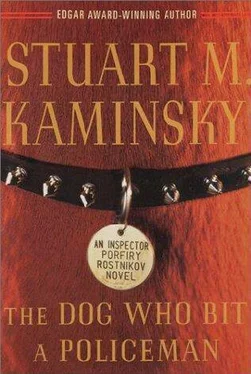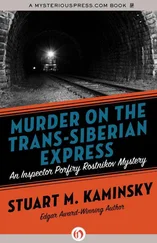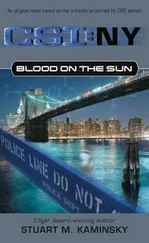Stuart Kaminsky - The Dog Who Bit a Policeman
Здесь есть возможность читать онлайн «Stuart Kaminsky - The Dog Who Bit a Policeman» весь текст электронной книги совершенно бесплатно (целиком полную версию без сокращений). В некоторых случаях можно слушать аудио, скачать через торрент в формате fb2 и присутствует краткое содержание. Жанр: Полицейский детектив, на русском языке. Описание произведения, (предисловие) а так же отзывы посетителей доступны на портале библиотеки ЛибКат.
- Название:The Dog Who Bit a Policeman
- Автор:
- Жанр:
- Год:неизвестен
- ISBN:нет данных
- Рейтинг книги:3 / 5. Голосов: 1
-
Избранное:Добавить в избранное
- Отзывы:
-
Ваша оценка:
- 60
- 1
- 2
- 3
- 4
- 5
The Dog Who Bit a Policeman: краткое содержание, описание и аннотация
Предлагаем к чтению аннотацию, описание, краткое содержание или предисловие (зависит от того, что написал сам автор книги «The Dog Who Bit a Policeman»). Если вы не нашли необходимую информацию о книге — напишите в комментариях, мы постараемся отыскать её.
The Dog Who Bit a Policeman — читать онлайн бесплатно полную книгу (весь текст) целиком
Ниже представлен текст книги, разбитый по страницам. Система сохранения места последней прочитанной страницы, позволяет с удобством читать онлайн бесплатно книгу «The Dog Who Bit a Policeman», без необходимости каждый раз заново искать на чём Вы остановились. Поставьте закладку, и сможете в любой момент перейти на страницу, на которой закончили чтение.
Интервал:
Закладка:
“So,” said Iosef. “He was burned alive but he was dying?”
Paulinin looked up with satisfaction. It was the question he’d been waiting for.
“It is very possible. I’ll know more when I have finished my discussion with our headless friend. It would help if I could speak to him in German, but it is a language which I dislike.” He gently patted the scorched rib cage. “Now,” said Paulinin, “we bypass our second victim and go to the interesting pile of plastic bags.”
Paulinin moved to the pile of bags and looked at the policemen lined up attentively.
“I can salvage many of the photographs,” he said. “It takes time and delicacy, a skill those buffoons with all their equipment do not possess. I have already restored three of them to the point where the images can be seen with reasonable clarity. And I have begun carefully reclaiming pieces of tape, which I will put together onto a single reel and then copy.”
“May we see the photographs?” asked Iosef with just the proper tone of respect.
Paulinin nodded magnanimously and lifted three plastic envelopes. “I’ll hold. Don’t touch,” he said.
Iosef and Zelach moved forward to examine the photographs.
Emil Karpo remained where he was.
Even through the blur from the dim lights, the images on the photographs were clear. Yevgeny Pleshkov was in explicit and rather uninventive sexual positions with Yulia Yalutshkin in two of the pictures. In the third, he was in bed with Yulia and another woman, a very young woman.
“We will need everything as soon as possible,” said Iosef.
“As soon as possible,” said Paulinin. “And I decide when that shall be.”
“You’ve done an amazing job,” said Iosef.
“Yes,” said Paulinin. “It is odd, but I do not like Germans any more than I like their language. My father was killed by them.
Three of my uncles were killed by them. But when they are dead and on my table, they are not only forgiven, they become my friends and we talk. Death unites us.”
All three men knew that Paulinin had frequently been heard speaking to corpses with great animation.
“And now,” he said, “the big gangster.”
He went behind the corpse of the dead Chechin, placed his gloved hands on the table, and said, “Shot two times. Either would have been fatal. Very close range. The same gun that was used to shoot the Tatar in the river. Considering his wounds, the fact that he was capable of speaking to the guard who found him before he died indicates this man’s strength and the certainty that whoever shot him did so within a minute or two of his death. He too will tell me more. Perhaps he will even yield the name of the person who shot him.”
Emil Karpo had listened attentively.
Rostnikov, whom he had tried to locate before coming to the lab, could not be found. It was essential that he know about the murder of the Chechin before an all-out war began in the streets between the Chechins and the Tatars. It was not the lives of the gangsters about which Karpo was concerned. It was the innocents, always the innocents, who might well be the victims of the gangsters, notoriously poor shots.
“Now,” said Paulinin, “I would like to be left to do more work.” He looked down protectively at the white corpse before him.
“Thank you,” said Karpo. “Lunch tomorrow?”
“I’ll bring it,” said Paulinin with a sincere smile.
“No,” Karpo said, unwilling under any circumstance to eat anything Paulinin might make. He had frequently drunk weak tea prepared in this very lab, in specimen cups which may well have contained anything during their long lives. “It will be my treat, a sign of my great respect for your continued excellent work.”
“In that case,” said Paulinin, beaming, “I accept. One o’clock?”
“One o’clock,” Karpo confirmed as he turned and led the way for the other two detectives through the maze of tables, piles of jars, books, and pieces and bits of mechanisms of all types and many sizes.
Iosef knew that somewhere in this museum of clutter his father’s leg floated in a huge jar. He was sure, should he ask, that Paulinin would be happy to show it to him. Iosef had no desire to see it.
Before coming to Iosef ’s laboratory for the demonstration, Emil Karpo had finished checking the newspaper clipping files-
the computer had been of no help-for the information that would confirm his memory of the shoot-out. Karpo had found what he had been looking for. The clippings had not been mis-filed. They had simply never been properly filed at all. Going through them required a knowledge of what you were looking for and when it might have taken place.
One article contained the name he sought. It was mentioned but once. Karpo made a copy of the article, folded it neatly into his wallet.
Now, knowing the identity of the killer, he would have to find Rostnikov.
Yevgeny Pleshkov, the hope of Russia, the pride of Petrovar, could think of no place to hide and no one to go to. He had considered staying with Oleg, but the police had already been to Oleg and might be checking his apartment for the missing politician. Besides, Oleg had appeared greatly upset by the suggestion that his friend might stay with him. Yevgeny considered telling his friend that he knew of Oleg’s preference for men, had known it for years, probably even before Oleg knew, but if the man wanted to hold onto his image, Yevgeny was not one to pull it from him.
“I have. . visitors,” Oleg had said. “Other coaches, members of the team. It wouldn’t be safe.”
Yulia had left Yevgeny in the park, where he sat on a bench watching some small children play and wondering if it was going to rain. He had money in his pocket but no desire for drink, women, or food.
The children in the park were kicking a soccer ball. They were no more than four or five. The ball came to the seated Pleshkov, who made an effort to kick it back to the children without rising. The kick dribbled off the side of his right foot and rolled a few pathetic feet. One of the children, a boy wearing a shiny purple jacket, picked up the ball and gave the dirty man on the bench a look of disdain. Then the boy ran away shouting, “I’ve got it.”
Years ago, actually not that many years ago, Yevgeny and Oleg had played side by side. Yevgeny was a striker. Oleg was a left-wing. Together they had set park league records, and Oleg had gone on to the professional ranks and a coaching career.
Now, Yevgeny could barely get his foot on the ball.
He had murdered a man. Yulia had photographs and tapes that could mean the end of his career, especially the one that seemed to show Yevgeny nude in bed with an equally nude young man who was kissing him. Yevgeny remembered no such incident. It was Oleg who liked other men, not Yevgeny; Yevgeny had been outspoken in his condemnation of drug use, gangs, homosexuality, and alcohol. His positions were part of the campaign that was winning over the hearts and minds of those who had enough of the pleasures of democracy. Yevgeny was not a Communist, never had been, but he truly believed that the best path to gainiing the rights of hardworking and voting Russians was a return to sanity and order with a new, more temperate democracy.
Yevgeny tilted his head back, rubbed his very bristly chin and face, and knew what he must do. He could not sit all day on this bench watching children play and waiting for the rain. Yulia might or might not return. She would certainly be questioned by the police. No, he could not sit here all day and possibly all night.
He had to relocate some fragment of his dignity. He decided to call his wife and son and ask them to come and get him.
Rostnikov got the message from Karpo. It was sitting on his desk when he returned to Petrovka as thunder shook the walls of his office. Thunder, but still no rain. Rostnikov wore a strange suit of light blue pants and a dark blue jacket he had accepted from Leon’s collection of his late father-in-law’s clothes.
Читать дальшеИнтервал:
Закладка:
Похожие книги на «The Dog Who Bit a Policeman»
Представляем Вашему вниманию похожие книги на «The Dog Who Bit a Policeman» списком для выбора. Мы отобрали схожую по названию и смыслу литературу в надежде предоставить читателям больше вариантов отыскать новые, интересные, ещё непрочитанные произведения.
Обсуждение, отзывы о книге «The Dog Who Bit a Policeman» и просто собственные мнения читателей. Оставьте ваши комментарии, напишите, что Вы думаете о произведении, его смысле или главных героях. Укажите что конкретно понравилось, а что нет, и почему Вы так считаете.












